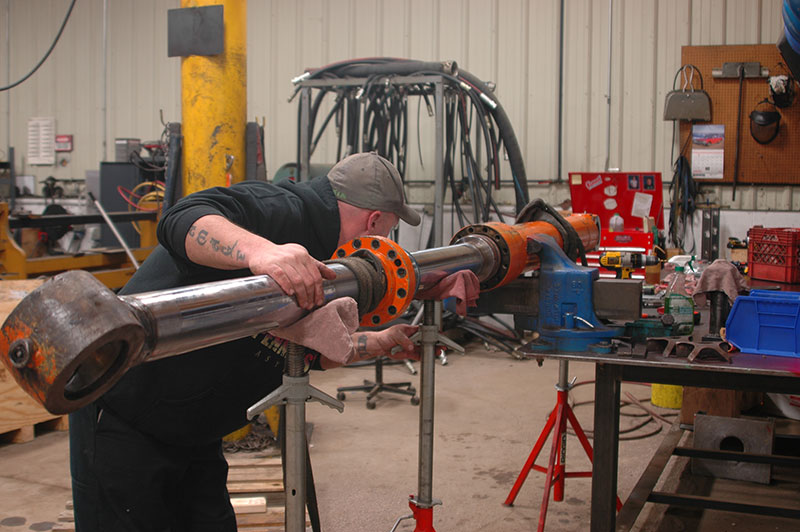Hydraulic cylinders play a critical role in many industrial applications. These devices use fluid power to produce linear motion, making them an essential component of various machines and systems.
However, like any mechanical device, hydraulic cylinders are susceptible to wear and tear, which can result in various problems that affect their performance. When hydraulic cylinders fail to operate correctly, it can cause significant downtime and loss of revenue for businesses.
In this article, we will explore Common Hydraulic Cylinder Machine problems and their root causes. We will also provide solutions that can help troubleshoot these issues effectively.
Common hydraulic cylinder problems
Leaks can occur for a variety of reasons such as worn seals and packing or damaged cylinder walls or piston rods. These leaks can lead to loss of pressure and ultimately decreased performance.
An issue that can arise with hydraulic cylinders is rod scoring and pitting. This occurs when dirt or debris gets trapped between the rod and the seal, leading to damage over time. This problem can also be exacerbated by inadequate lubrication or high operating temperatures. It is important to regularly inspect cylinders for signs of scoring or pitting to prevent further damage and potential failure.
Finally, hydraulic cylinders may also experience bending or twisting due to excessive loads or external forces such as collisions. This issue can cause uneven wear on the piston rod and seals, leading to premature failure if not addressed promptly. Regular maintenance checks and proper use of equipment can help prevent these types of issues from occurring in the first place.

Contamination and its Role in hydraulic cylinder failure
Contamination is one of the most common problems that can cause hydraulic cylinder failure. Foreign particles, such as dirt, dust, and water, can enter the Hydraulic Power Units and damage internal cylinder components by becoming lodged between seals and cylinder walls. These contaminants are often responsible for leaks of hydraulic fluids, which can cause a drop in pressure in the system. If this happens, it is important to clean the system quickly to prevent further buildup of contaminants.
To prevent contamination, it is important to use appropriate filters to separate foreign particles from the hydraulic fluid before it circulates through the system. It is also essential to regularly monitor the level and quality of the fluid to ensure that it remains clean and free of contaminants that can cause damage to the hydraulic cylinder.
Overheating causes and prevention
One of the most common issues faced by hydraulic cylinders is overheating. Overheating can cause significant damage to the cylinder and lead to failure if not addressed promptly. There are several causes of hydraulic cylinder overheating, such as high fluid viscosity, excessive friction, and inadequate cooling. High fluid viscosity can cause overheating due to the increased resistance to flow within the system.
This can be caused by low-quality fluids or fluids that have been contaminated with debris. Excessive friction between moving parts can also lead to overheating as it produces heat that cannot be dissipated efficiently. Ensuring proper lubrication and reducing friction through regular maintenance is essential in preventing this issue.
Cylinder drift and how to fix it
Cylinder drift is a hydraulic cylinder problem that occurs when the cylinder rod moves or drifts from its normal position. This can happen even when the control valve is in neutral position, causing serious issues for machines that require precise positioning. The cause of cylinder drift can be traced to several factors, including fluid leaks, worn-out seals or damaged bearings.
The most effective way to fix cylinder drift is to identify and address the root cause of the problem. Inspect the seals and bearings for damage or wear, and replace them if necessary. Check for any leaks in the hydraulic system and fix them immediately. It’s also important to make sure that the hydraulic fluid is clean and free from contaminants that can cause damage over time.
Concluding thoughts
The hydraulic cylinder is an essential component of many machines and vehicles used in various industries. Understanding the common problems that can occur with hydraulic cylinders is crucial to preventing downtime and ensuring reliable operation.In conclusion, regular maintenance and inspection are critical factors in preventing hydraulic cylinder failure.

